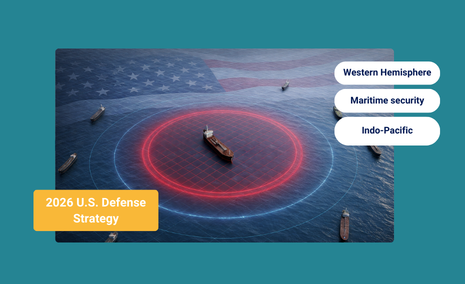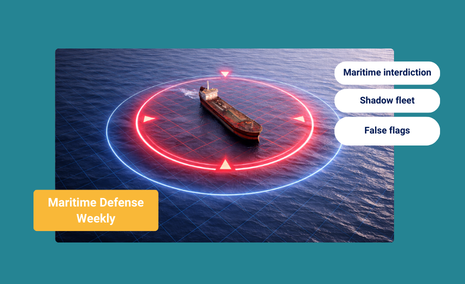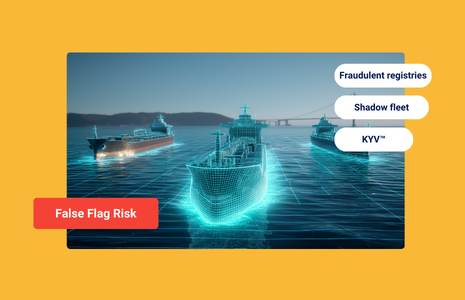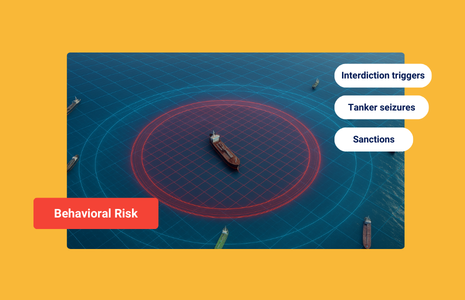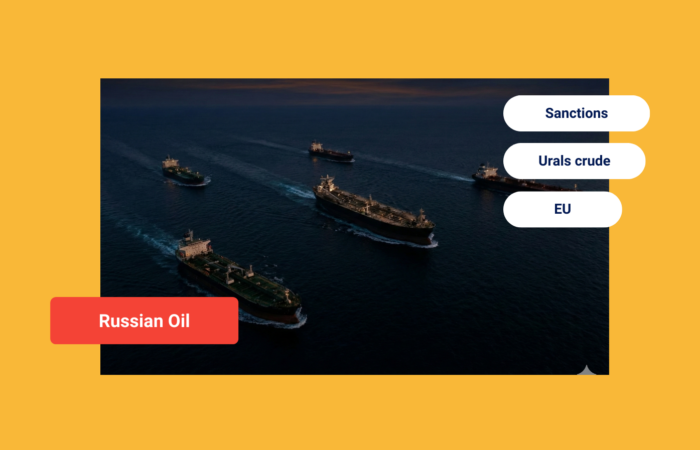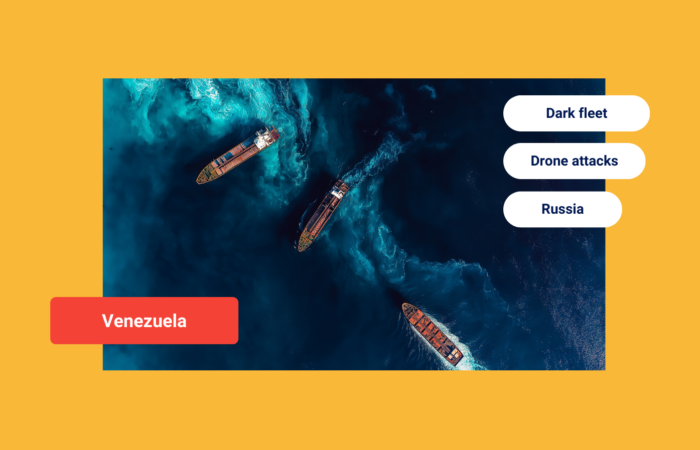Unprecedented Maritime Compliance Challenges Emerge from EU’s 18th Sanctions Package
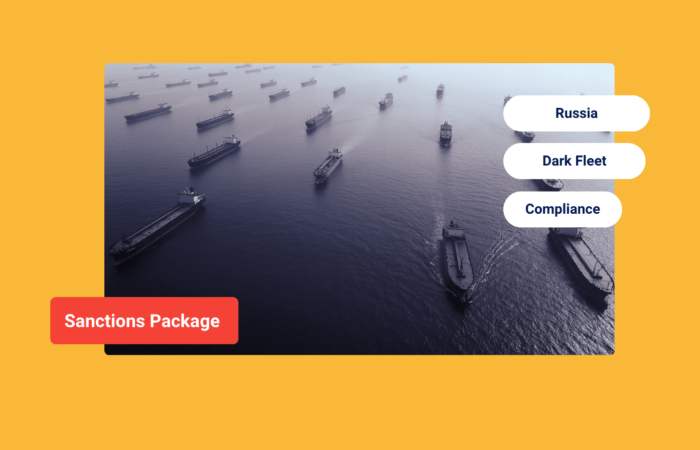
What’s inside?
The European Union’s 18th sanctions package on Russia recalibrates global oil trades once again and intensifies shipping risk and compliance complexity across the maritime domain.
Western sanctions have already bifurcated global trade. Now, enforcement is similarly diverging: while the EU introduces a dynamic price cap mechanism, alongside the UK; the United States continues to uphold its $60 per barrel cap.
For the first time, flag registries and a refinery were directly sanctioned, amid sweeping adoption of secondary sanctions to tackle Russia sanctions evasion outside the EU27.
Expansion of Dark Fleet Sanctions
105 new vessels were added to the EU sanctions list which bans access to EU ports.
These tankers are part of the broader “dark fleet” used to evade the oil price cap through deceptive shipping practices such as:
- Flag hopping and the use of fraudulent registries
- AIS manipulation
- Deliberately complex ownership and management structures
More than 440 tankers are now sanctioned by the EU.
100% of the newly sanctioned vessels were flagged as risky by Windward prior to their designation, mostly due to port calls in sanctioned regimes, dark activity, Location (GNSS) Manipulation, illicit ship-to-ship transfers, and suspicious cargo indicators.
96% were classified as part of the dark fleet, and none as ‘gray fleet’, meaning all were trading with other sanctioned jurisdictions, as well as Russia
66% were previously sanctioned by other regulators.
Gabon and Comoros Ship Registries Targeted
UAE-based Intershipping Services LLC, operator of the Gabon and Comoros ship registries, was listed for flagging ships that allowed opaque and high-risk transport of Russian oil.
The company runs Comoros’ registry through its India office. Intershipping is now subject to asset freezes and funding bans across the EU.
As per Windward Maritime AI™ data, 146 of the nearly 1,200 ships flagged to these registries are linked to EU or UK companies, further complicating their maritime compliance.
Comoros has continued to flag Western-sanctioned vessels, even as other registries serving Russian oil and shipping have moved to delist such ships. According to Windward, 132 Comoros-flagged vessels are currently under Western sanctions.
The unprecedented targeting of flag registries aims to curb the rise in flag-hopping, as tankers seek sanctions safe havens. In recent months, some vessels have re-flagged three to four times in an effort to stay ahead of regulators.
Revised Oil Price Cap: Is a Tonnage Crisis Looming?
A new dynamic price cap of $47.60 per barrel will take effect on September 3, 2025.
Revised every six months, the cap is calculated as the average Russian crude price minus 15%, based on data from authorized price reporting agencies.
A 90-day grace period will apply to existing contracts.
Under the new rules, vessels and service providers are prohibited from transporting Russian crude to third countries unless the oil is sold below the capped price.
This measure is expected to trigger an immediate and significant reshuffling of Russia’s tanker market share.
More than 40% of Russian oil was legally shipped on Greek-owned ships last month, as Urals crude averaged below the $60/bbl cap for a fifth consecutive month.
Greek owned ships also dominate exports of Russian diesel, whose price has remained well below the $100/bbl price for refined products for more than 12 months.
The cap for refined products as well as $45/bbl for fuel oil remains in place.
Unless Russian oil companies agree to sell at lower prices, these Greek-owned tankers will now exit crude trades, with uncertainty over how this gap will be plugged.
Hundreds of possible replacement tankers remain sanctioned by the EU, UK or US.
This will test whether ports at importing countries will allow EU-sanctioned tankers to discharge but could also lead to evasion tactics further evolving.
Russian cargoes are often loaded at Russia’s eastern ports on US-sanctioned ships and then transferred to ‘clean’ tankers for delivery in China, adding to logistics complexity.
Chinese and Indian ports have previously shown they are willing to receive Russia crude cargoes on EU-sanctioned tankers.
But the imposition of secondary sanctions on companies in third countries in this latest package may mean existing policies are reexamined in light of exposure to Europe or the UK.
Ban on Petroleum Products Derived from Russian Crude
The EU will ban imports of refined oil products — such as diesel, gasoline, and jet fuel — produced from Russian-origin crude processed in third countries, effective January 21, 2026.
This marks another unprecedented disruption to global oil trade flows. As the world’s largest importer of middle distillates, Europe’s ban introduces significant cargo-tracking complexity for oil traders and the shipping industry.
Exceptions apply for imports from “partner countries” with equivalent sanctions regimes, including the US, UK, Japan, South Korea, and Norway.
While this measure targets long-standing concerns over the “laundering” of Russian crude by non-G7 refineries, its impact will be felt most acutely in India — the second-largest buyer of Russian oil and a major supplier of refined products to Europe and the UK. Turkey, which also imports Russian crude and exports diesel to Europe, is likely to be affected as well.
Alongside the ban, the EU has listed India’s Nayara Energy Vadinar refinery in Gujarat, which is 49% owned by Russia’s Rosneft.
Ban on EU Subsidiaries of Sanctioned Russian Companies
EU-based companies controlled by sanctioned Russian parents are now banned from operating if they follow the parent’s orders, or require the parent’s approval to act.
This prevents sanctioned Russian firms from continuing operations via “remote control” of EU subsidiaries.
Crackdown on Non-Russian ‘Enablers’
In a significant shift in enforcement strategy, non-Russian companies that facilitate sanctions evasion including oil traders, shipping firms, and service providers based in jurisdictions such as the United Arab Emirates, India, Singapore, and Mauritius were targeted.
Companies were directly sanctioned for enabling the shipping or financing of oil, or disguising Russian-origin oil in breach of EU restrictions by:
- Re-exporting Russian oil under falsified origin documents or after refining it in third countries
- Supplying the dark and gray fleets with services or technical assistance even if they were not EU-based
- Assisting in breaches of the oil price cap, whether through opaque payment schemes, ship-to-ship transfers, or failing to verify attestation documents on cargo pricing
This expansion aims to frustrate traders and shipowners operating from other jurisdictions. The EU can impose asset freezes, funding bans, and port entry restrictions to those identified as undermining EU policy objectives by enabling sanctions circumvention.
This policy shift sends a clear signal that compliance obligations extend beyond the EU’s borders but the effectiveness of this measure is questioned.
The US is weighing the imposition of secondary sanctions on Russia but has yet to act. With most shipping concluded in US dollars, this is likely to hit harder, if enacted.
Oil Traders at Center of the Dark Fleet Targeted
The package also extended to trader Coral Energy and related entities that were shipping oil for Russian producer Rosneft. The shipowner and manager of a falsely flagged tanker that in May refused Estonian coast guard orders to sail into its waters, along with the tanker’s master, were also sanctioned.
The EU billed its package as the toughest ever, and adds to the evolving, fragmented and contradictory sanctions environment. As Western strategies diverge, global compliance is not only more complex, but risks harder to identify and surmount, as hazards rise in these new, contested regulatory spaces .
Trending
- The EU’s 18th Sanctions Package Lookback Started. Trading Russian Products? You're At Risk. Nov 24, 2025
- Tanker Freight Rates Hit Five-Year High Amid Russian Oil Sanctions Shake-Out Nov 6, 2025
- Sanctioned, Stateless, and Still Sailing: Expert Insights from the Frontlines of Maritime Sanctions Nov 3, 2025

